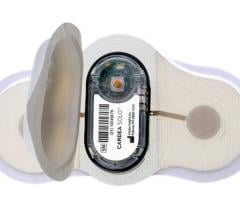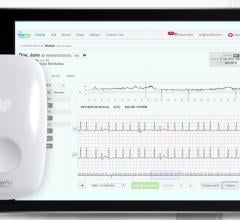
February 20, 2015 — Medtronic announced the results of a new "real-world" study of patients who have had a cryptogenic stroke, in which the Reveal Linq Insertable Cardiac Monitor (ICM) detected atrial fibrillation (AF) in everyday practice at an even greater rate than that found in a recent clinical trial (the CRYSTAL AF Study, which was published in The New England Journal of Medicine).
The observational real-world study — which is being presented at the American Stroke Association's International Stroke Conference 2015 in Nashville, Tennessee, this week — evaluated 1,247 cryptogenic stroke patients (those who suffered a stroke of unknown cause) across the United States to determine whether AF could be detected using long-term, continuous cardiac monitoring. At 182 days of monitoring (median), AF was detected in 147 patients, resulting in an AF detection rate of 12.2 percent, which was nominally 37 percent higher than the rate observed in the CRYSTAL AF Study (published in The New England Journal of Medicine) at the same time point.
"Unlike a randomized study, an observational study provides a practical way to study real-world clinical practice. What's most exciting is that the detection of AF in real clinical practice exceeded that observed in the rigorously-controlled CRYSTAL AF study, allowing physicians to intervene even more with stroke preventive therapies," said study co-author Mark Richards, Ph.D., M.D., director of Arrhythmia Services at ProMedica Physicians Cardiology in Toledo, Ohio. "This suggests that AF may go undetected at an even greater rate and reinforces the benefits of long-term rhythm monitoring in cryptogenic stroke patients."
AF is a common cardiac condition when the heart beats irregularly or rapidly; patients with AF are five times more likely to have a stroke due to small blood clots that may form in the heart and subsequently travel to the brain, obstructing a major blood vessel leading to an ischemic stroke.
Undiagnosed AF is believed to be responsible for a significant portion of cryptogenic strokes; however, because AF often has no symptoms, it may not be detected by conventional monitoring techniques such as in-hospital monitoring, electrocardiography or traditional ambulatory cardiac monitors such as a Holter. Unlike conventional monitoring methods, the Reveal LINQ ICM automatically and continuously detects and records abnormal heart rhythms for up to three years.
In addition, results from a different analysis (based on the AF detection rates found in the randomized CRYSTAL AF study) demonstrated for the first time that the use of long-term, continuous cardiac monitoring is a cost-effective method of detecting AF in cryptogenic stroke patients. Presented at the International Stroke Conference, the incremental cost-effectiveness ratio (ICER) associated with the Reveal XT ICM in the study, compared with the present standard of care, was well within the cost effectiveness range that the United Kingdom's National Institute of Clinical Excellence (NICE) considers acceptable based on an established cost effectiveness threshold.
In the CRYSTAL AF study, detection of AF with the long-term cardiac monitor was superior to conventional monitoring methods (30 percent with the ICM, and 3 percent with standard monitoring at 3 years; p=<0.0001) that are the current standard of care over a three-year follow up.
"These results show that continuous cardiac monitoring with an ICM is a cost-effective tool," said Klaus Witte, M.D., FRCP, FESC, FACC, associate professor and consultant cardiologist, and lead clinician for cardiology at the University of Leeds and Leeds Teaching Hospitals NHS Trust in the United Kingdom. "Detecting AF in cryptogenic stroke patients enables physicians to change their medical therapy so we can reduce their risk of having a second stroke."
For more information: www.medtronic.com


 July 22, 2025
July 22, 2025 



